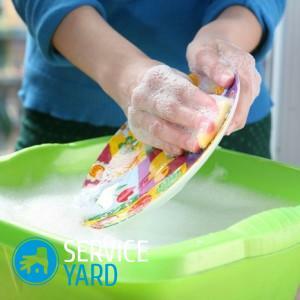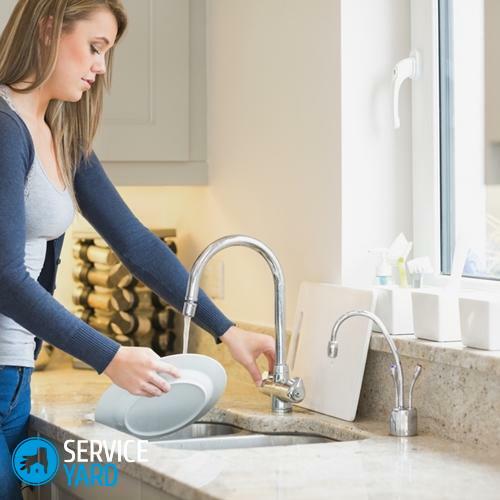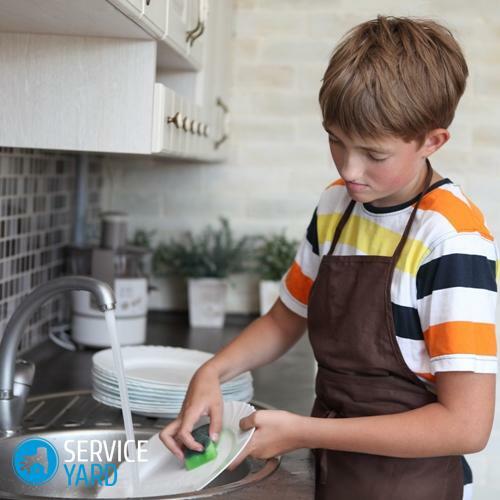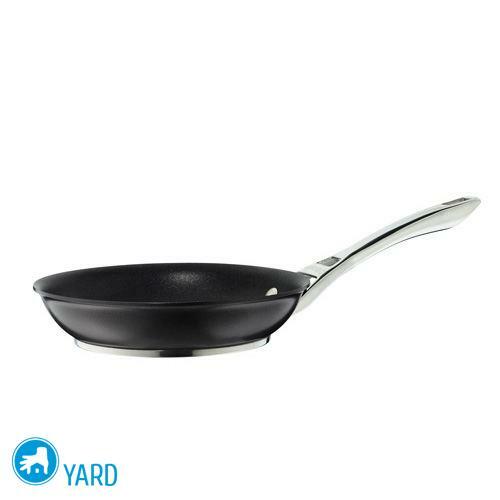
- Facts about the composition of household chemicals
- How to wash dishes without detergent?
- Washing dishes with mustard
- Washing dishes with soda
- Washing dishes with laundry soap
- Washing dishes with wood ash
- Washing dishes with pumpkin leaves
Absolutely every person understands that any chemical agent is harmful, moreover, weeat them, put on ourselves, breathe and just use chemically contaminated substances in everyday life. Probably one of the most dangerous methods of using chemicals can be called washing dishes, because we eat from it, and therefore we inject into the body toxins from detergents. The next question arises - how and what to wash the dishes without chemistry? Let's find the answer together.
to the table of contents ↑Facts about the composition of household chemicals
We wash our dishes more than once a day, especially for large families. Not surprisingly, most of them use exactly the chemical products bought in the store on a chemical basis. Let's take a look at the label and read the composition. Most of the products contain surfactants, all kinds of perfumes and no less harmful synthetic components.
Important! In its pure form for washing dishes, it is strictly forbidden to use it, because the surface of even the most smooth and high-quality dish is far from ideal, but consists of a mass of scars into which the powder will sink, and as a result, it will also fall into your stomach. However, rarely anyone in practice breeds concentrate and follows the rules of use from the manufacturer. Usually we lavishly apply the chemistry directly to the pots, plates or, at the very least, to the sponge. As a result - we use household chemicals in more quantities than is actually required. And then we ask ourselves why we often get sick, where is the incomprehensible allergy?
But who so simply will refuse cheap, effective and quickly foaming means? This can be done if you find alternative means by which you can wash dishes without chemistry.

How to wash the dishes without detergent?
First we take out all our utensils, absolutely everything and rub it with mustard powder, then rinse with running water. Why did we do this? In order to wash away the remnants of chemistry from the dishes.
Important! Mustard powder will help you get rid of almost all the phosphates. Sense to look for, than to wash dishes without chemistry, if it has settled steadily for kitchen utensils?
Next - you need to choose exactly that homemade detergent that you like. Yes, there are not one, not one.
Read carefully and choose:
- Wash dishes with mustard.
- With ordinary soda and calcined.
- With wood ash.
- With the help of laundry soap.
- With the help of pumpkin leaves.
Each of these methods is valid and now we will consider each of them separately.
to the contents ↑Washing dishes with mustard
This method is the most popular, it was used by our great-great-grandmothers 200 years ago. Now mistresses have perfected this method:
- add a little vinegar to the mustard powder;
- the entire mixture is mixed in a jar until a uniform mixture is obtained;
- then 3 tablespoons freshly prepared product is added to hot water and left for 5-10 minutes.
This kind of water should be washed dishes and do not worry about safety for health. One simple solution to how to wash dishes without chemicals, is found.
Important! Buy mustard is better not to use it, because it also contains a lot of chemicals. In our version, the mustard is easily replaced with mustard powder, which is ideal even for non-stick coatings.
The second way of using mustard powder is to pour it in a small amount directly onto the sponge or washcloth and wash it with a plate. This method is suitable only in cases where the dishes do not have Teflon or any other non-stick coating. Any abrasive agents, including powder, affect such a surface in an unfavorable way - it spoils and loses its properties.
Important! It is worth noting that the mustard does not work well on the hands, even if you wear gloves. So do not try to do better using a lot of money, do just good, acting within the reasonable.
to the contents ↑Washing dishes with soda
Soda, like food and calcined, are powerful tools that will cope with any contamination. But you need to remember that soda can scratch some very sensitive surfaces, such as Teflon. But washing glass, porcelain or kettle is absolutely safe.
Put the sponge in ordinary soda, wipe it with a plate, rinse with water and it will surely shine.
Important! Aluminum kitchen utensils are best not washed with soda. From her appliances darken.
Calcined soda is an even more effective means. Most often it is laundered basins, pans or pots. A tablespoon of this product is added to a liter of warm water and this solution is washed with dishes.

The effect is simply unmistakable cleanliness. This tool is also advised to wash and children's plates, appliances, in contrast to conventional baking soda, which indicates a high level of safety.
Important! With any soda you need to work only in gloves, since this is an alkali, not very pleasant for the skin.
to the table of contents ↑Washing dishes with laundry soap
This method of how to wash dishes without chemistry is just a godsend for today's housewives. It is so universal that it is easy and without harm. For health it is possible to wash, wash floors and utensils, use it as a shampoo and shower gel.
Important! As part of the laundry soap only vegetable and animal fats, which absolutely do not harm the person.
How useful is this soap for any kitchen items - it will quickly remove dirt and grease from it, as well as disinfect, relieve many viral diseases. For example, a plate after a person who has become ill with the flu, it is better to wash it with household soap.
Important! Unlike other detergents with chemical composition, the laundry soap is easily washed off with ordinary running water.
There are several methods of washing dishes with household soap:
- simply soap it on a sponge, and with foam, wash off the grease from the plates;
- a small piece of soap grate, sawdust melt in water, which can be used to wash the desired object.
Washing dishes with wood ash
As strange as it sounds, ash also helps in the fight against fat on plates, even children's. It is ash that is on the second place after soda by the rate of dissolution of fat and other dirt. Our ancestors actively used it, which means we can also use it. A particularly simple task for those who have a home is a stove or fireplace. It is also excellent for cleaning cast iron, baking trays and boilers.
The way of using ash is very simple: it is necessary to pour it on a damp dish, and then rub the object with a washcloth. The remains of ash should be washed off with warm running water.
Important! Strongly it is not recommended to use ashes from polyethylene, fabric and other wastes. Only dishwashing ash is suitable for washing dishes.
to content ↑Washing dishes with pumpkin leaves
Probably, this is the easiest way to wash dishes without chemicals, which is very often used in villages. It is only necessary to rip out a few pumpkin leaves and use them instead of a washcloth. This method, judging by the reviews, is also very effective and the task, rather than washing dishes without chemistry, is solved.
As you can see, our ancestors remarkably dispensed with both detergents and without other chemicals. Why do not we try to put phosphates aside, properly adjust our way of life and thus extend our lives?



